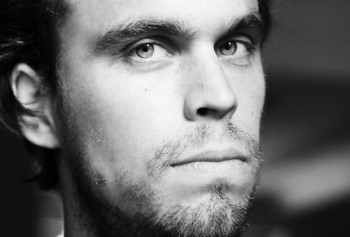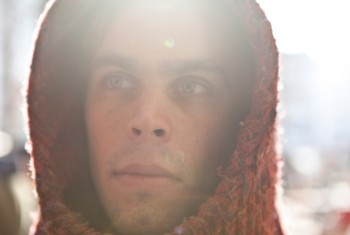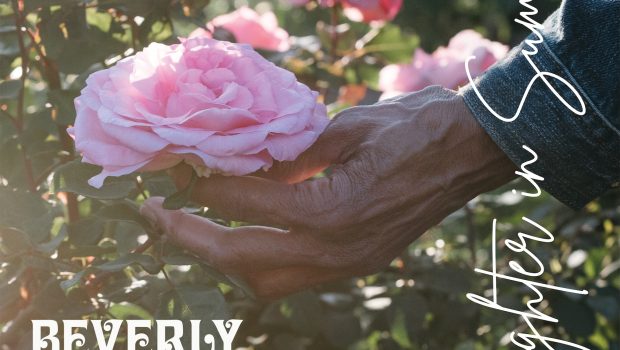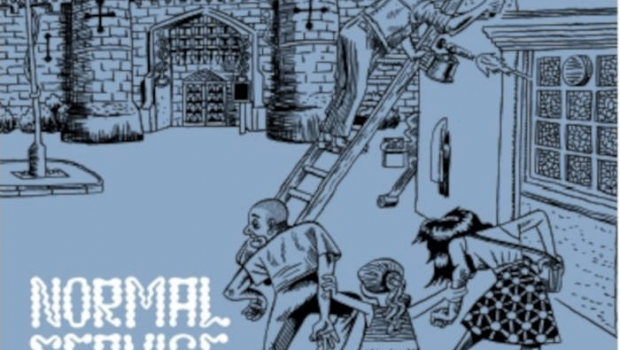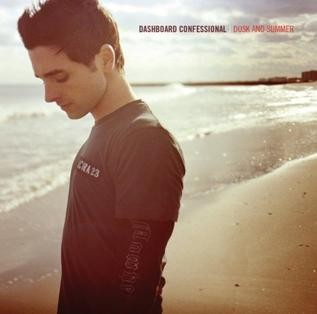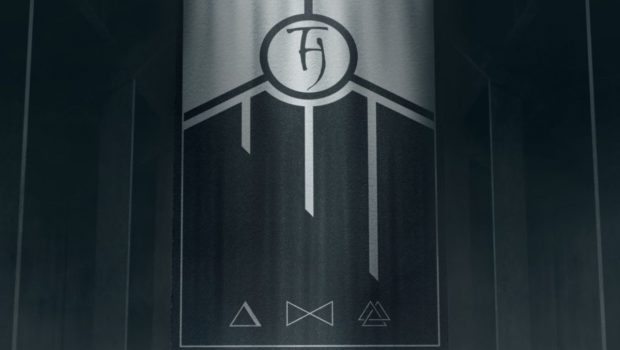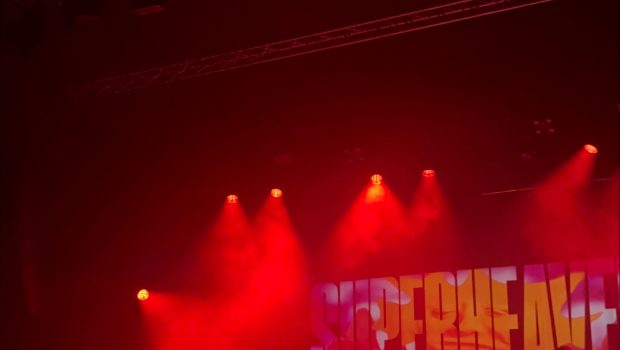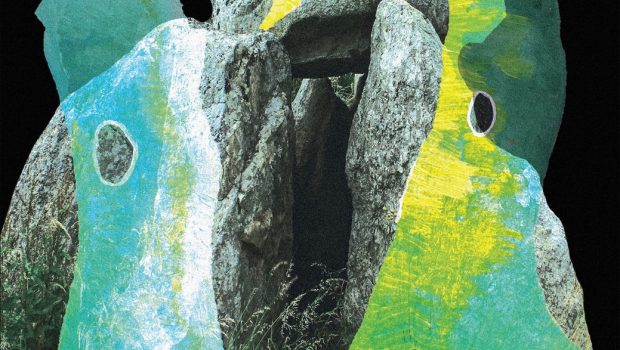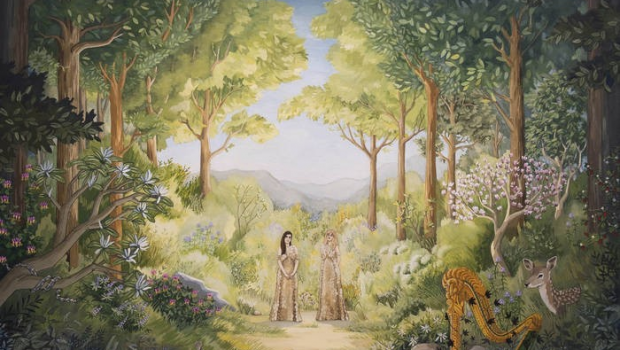– ANTHONY BURGESS FOUNDATION, MANCHESTER –
I did not know who Peter Broderick was until I saw the Mancunian gig advertised. I listened to a few songs and I decided to go and check him out live. I trust Hey! Manchester and I like going to the International Anthony Burgess Foundation because they have an eclectic programme and, despite the austere walls of brute bricks covered with modern frames, it’s a cosy, secluded space filled with warm red-coloured interior details.
When I arrive at 8.30pm, the all-purpose room hosts a small crowd of roughly 60 people, quiet and charming. Hipsters without the hipsterical bits. Pwrhaus is singing and playing guitar and piano and Peter Broderick is sitting at the back of the room, listening to his tour companion and warming up for his own performance. I approach him and ask if he minds me taking photos, and he kindly says ‘no, not at all’. That was before my camera displayed the dreaded ‘ERR 99’ screen, the DSLR equivalent to the ‘404 error – page not found’, killer of all photographic dreams and, alas, the end of my visual reportage from the IABF.
Peter Broderick comes from Oregon, and he has recorded a lot of solo material, with indie Danish band Efterklang and collaborated with several musicians from the U.S. and Europe, among which M. Ward, Yann Tiersen, Greg Haines, Sharon Von Etten, Clint Mansell and Nils Frahm. Tonight he is dressed as a lumberjack, and I can’t help thinking of Monty Python, who are most definitely not appropriate for the context, so I suppress the thought. And the more I suppress it, the more persistently it pops up.
Pwrhaus fits well in this building called Engine House, which is, not surprisingly for Manchester, a former mill, possibly the largest in town. In the 19th century, the mill employed more than 2,000 workers, spinning and weaving for probably 18 hours a day, and was owned by Hugh Hornby Birley, industrialist and captain of the notorious Manchester and Salford Yeomanry responsible for the Peterloo Massacre (named in Napoleonic fashion) of 16 August 1819 in St Peter’s Field. As many of you know, on that shameful day for democracy, remembered by comrade P.B. Shelley in ‘The Masque of Anarchy’, a crowd of about 60,000-80,000 people had gathered to discuss political representation (only 2% of citizens had the right to vote for the parliament at the time). The Corn Laws introduced in 1815 to protect local grain producers had prevented the import of grain from abroad, causing a steep increase in the price of bread and aggravating the already appalling condition of the urban proletariat, who had little to no negotiating power. Soon after the arrival of radical orator Henry Hunt, the local magistrates ordered the military authorities to arrest Hunt and disperse the crowd. Cavalry charged into the crowd, with the result of an estimated 18 people killed and 700 injured. Now it’s almost 200 years later and, on the same floor where those dead bodies lay, we walk to go and enjoy our gigs at The Albert Hall. And, since shooting unarmed people with low wages has become illegal – although it still happens and frequently – Mr Birley’s descendants now have to shoot partridges for fun. You will excuse me for the digression.
So, we were talking about Pwrhaus, also known as Tonality*Star. Portland, Oregon, seems to nurture a never-ending list of musicians, and that’s where this artist comes from. He’s got an amplified guitar and a beautiful voice that switches from delicate to powerhouse, not to mention his killer gender-bending look. Pwrhaus’s lyrics are mostly about love and its transformative power and, he admits, he has ‘a lot of sad songs’ in his repertoire. A cute embodied blend of Rufus Wainwright, George Michael and Badly Drawn Boy, Pwrhaus thanks Broderick for taking him on tour and comments ‘man, that guy is goooood!’ and invites him on stage. Perhaps a bit over-romantic for my liking, Pwrhaus’s mellow set is nevertheless a pleasant introduction to the next part of the evening. Check out the artist’s psychedelic webpage and get lost in kaleidoscopes, 1970s visual aesthetics and cats showing marbles on their tongue. Definitely somebody to keep watching in his various alter egos.
Unlike other venues, at the IABF they understand the concept of amplification, and tonight’s sound is perfectly customised and proportionate to these two artists’ styles. You can hardly hear a noise, the audience is very attentive and you realise there is a crowd only when they clap, and they do clap supportively tonight.
At 9.15pm sharp Peter Broderick appears on stage, with a seductive cherry red archtop guitar. He tells us that it’s always ‘lovely to be back’ in Manchester, and he starts playing the haunting ‘Not At Home’, from his second album Home (2008, Bella Union). Through his magic pedals, Broderick records himself first on guitar, then on violin and piano, and creates a disquieting layered background for his intense singing. An unusual combination of chords, stripped bare lyrics and the fascinating versatility of this multi-instrumentalist all contribute to make him stand out in the contemporary panorama. It is particularly this song that makes me think of Elliott Smith, both for the vocal doubling effect and the melancholic atmosphere. A sublime opening to an evening that abundantly exceeds any expectations. I’m not the only one bewitched by this artist’s creativity, and the rooms bursts into a unanimous applause.
Broderick continues by introducing a new song and telling us that he’s experimenting with the low tones of his voice to prove himself that he’s eventually becoming a man. The way he plays with the range of his voice, blowing into the microphone and playing harmonics on guitar, contributes to create a unique sound and performing style, in a way that evokes Jeff Buckley’s experiments at Sin-é, despite the completely different music and voice.
The show unfolds with an impressive live version of ‘Colours Of The Night’ that fills the room with a palpable emotional tension. The audience is so silent that I fear my breathing might desecrate this religious ritual. I decide to breathe though, and desecrate.
One of the highlights of the night is the singing of ‘Love Defines You’ a capella, similar to the album version (Colours of the Night – 2015, Bella Union). The lyrics go ‘I refuse to see my life without the twinkle in my eye’ ‘your struggles only refine you’ and ‘you refuse to greet this life without a twinkle in your smile’. And if you don’t get what he means, ‘just give it a little while’. I like the way Broderick deals with introspection, in a no-frills way that touches upon some existential questions we all, at some point, grapple with. Broderick’s lyrics bring us back to the basics: happiness, identity, love, sadness, finding meaning. Broderick sings while walking along the aisle in the middle of the room, opens the door, delivers the strongest note in the bar, shuts the door and comes back on stage. Unlike other performers who resort to special effects to disguise their nothingness, Broderick doesn’t need special effects, because he is able to appeal with his linear, poignant lyrics which are often supported by beautifully creative videos, such as the peaceful bare landscape of ‘Below It’ or the animations in ‘It Starts Hear’, the title track from the same-titled album of 2012.
Broderick then plays an instrumental piece on piano and a cover of an Irish musician and friend called Bridget (of whom I miss the surname). ‘I learn to know about people by playing their songs’, he explains. The lyrics go ‘I just want to collapse into you, but I don’t know if you want me to’, an all too familiar predicament for many, I assume. The following tune is played on violin; he wrote it for a couple of friends who were getting married. In the middle of the performance that sounds like a contemporary pop Vivaldi, Broderick messes up a few notes and says, while still playing: fuck! that wasn’t what I was supposed to do’, which makes us love him even more, obviously.
Broderick then invites Pwrhaus on bass for the next song, the romantic ‘I’ve Tried’, from These Walls Of Mine, in which Broderick becomes a beatbox à la Bobby McFerrin. It’s time for my favourite, finally, the fingerstyle gem ‘Below It’, with Pwrhaus on back vocals. We all listen in ecstatic rapture, the atmosphere is quite special tonight, and I feel privileged to be here.
Broderick asks us if we’d prefer an unreleased song or an old one. A pragmatic guy replies: both! So the musician gives us ‘More and More (Mouth Trumpet Version)’, singing along his solos like George Benson while also imitating the trumpet like Chet Baker.
The last song before the encore is a rap about a homeless man sleeping in the street, on whom he is trying to place a blanket, startling the man who goes ‘wow! Peter Broderick!’, pulling out a Peter Broderick CD. Broderick is a story genius, and has always been, as you can see from his high school videos.
It’s 10.15pm, the musician leaves the room for five seconds and comes back for the last song. He asks: guitar or piano? Piano it will be, for ‘Human Eyeballs on Toast’, from the 2010 EP How They Are, a song inspired by the book Eating Animals by Jonathan Safran Foer, as explained here.
Nothing Broderick does is banal and, despite my bias towards the recurrent inclusion of felines in his videos, that’s not the main reason why I like what he does. One of the reasons why I like Peter Broderick is because he has a webpage where he posts questions from his fans and his recorded answers. A fan posted a picture of pigeons on wires and asked him to play them as if they were notes on a music sheet. And he played them here on vibraphone. I think this is sufficient to support my whole pro-Broderick argument.
It’s all over and I’m left yearning for more. Now I have plenty of Peter Broderick music to catch up with but it will be hard to wait until the next tour. Do yourself a favour and listen to him.
Peter Broderick Official | Label | Youtube
